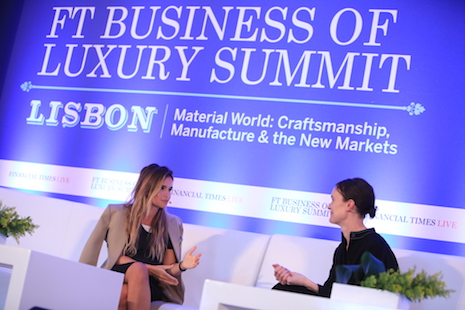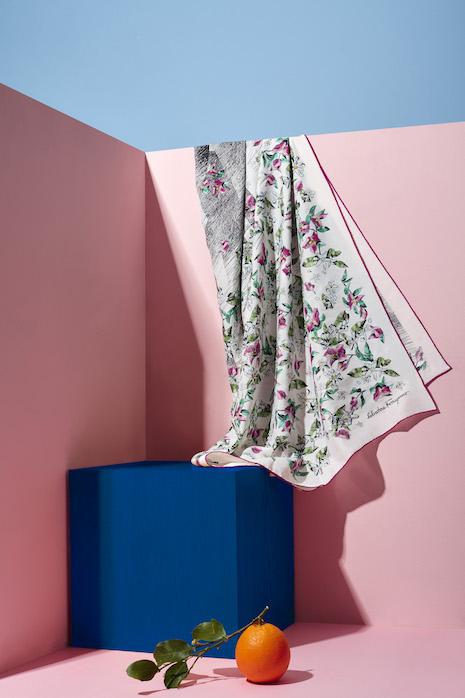LISBON, Portugal – The apparel and accessories industry is on the cusp of a new manufacturing revolution, but why should the technological transformation begin at the luxury level?
Setting out to demonstrate how luxury’s trendsetting position can fast track cutting-edge technologies, the CEO and founder of Fashion Tech Lab Ventures spoke with Financial Times’ fashion editor Jo Ellison during the FT Business of Luxury Summit May 16 on the subject. As consumer sentiment shifts increasingly toward ethical and sustainable goods, luxury is likely to benefit from the many innovations currently being developed in secretive laboratories strewn all over the world.
"The thing is, is that the process of running the industry on 100 percent renewable and alternative energy and resources is inevitable," said Miroslava Duma, CEO/founder of FTL Ventures.
"It will happen no matter what, it is just the way we go and the way the world goes," she said.
The fourth Industrial Revolution
During “The Manufacturing Revolution: How Technology Will Transform the Luxury Market” session May 15, Ms. Duma discussed how FTL Ventures connects brands with labs that are hard at work on innovative technologies.
In just five months, Ms. Duma has raised $50 million for FTL Ventures. The company includes three pillars, an investment vehicle, a collaborative arm and an experiential lab.
First, FTL Ventures brokers a relationship with labs, working to generate capital to support ongoing initiatives and pipeline projects.
Then FTL Ventures introduces the lab’s technology to a luxury brand, aiming for collaboration. Additionally, FTL Ventures enables labs to create goods independently using their specific technology, such as temperature-control apparel.

Left to right: Miroslava Duma in conversation with Jo Ellison at FT Business of Luxury Summit
An example of a FTL Ventures partner is a secretive San Francisco-based lab that grows leather and furs from stem cells. Since the grown materials are derived from authentic stem sells of a calf or mink, for instance, the result is a leather or fur of the highest quality imaginable.
FTL Venture has also partnered with a lab-grown diamond producer, Diamond Foundry.
Diamond Foundry recreates a true diamond by taking a microscopic piece of stone under carbon pressure to replicate a diamond that is identical to what is mined from the earth.
For diamond purveyor such as De Beers and Russia’s Alrosa, lab-grown diamonds may be the future of their industry as the natural diamond capacity is expected to end around 2030 and can also offset of blood diamond concerns.
FTL Ventures also supports circular economy initiatives that take discarded waste and upcycle the material into something new and useful.
For example, Italian fashion house Salvatore Ferragamo is demonstrating its dedication to sustainability with the first apparel collection created from fabric derived from citrus fruits.
The Orange Fiber Collection marries Ferragamo’s Italian craftsmanship and design with innovative research to create a truly sustainable fabric from natural origin.

Ferragamo worked with Orange Fiber, a FTL Ventures partner, on the limited-edition collection
Ferragamo is the first brand to use the exclusive Orange Fiber fabric in its designs, a twill similar in look and feel to silk.
The sustainable fabric begins with the peels of citrus fruits after they have been juiced. In Italy alone, discarded fruit rinds create more than 700,000 tons of by-product (see story).
According to Ms. Duma, when she first felt Orange Fiber, an FTL Ventures partner, she would have never guessed that the fabric was not actual silk.
Top to bottom
But, why start with luxury brands? Ms. Duma explained that while mass fashion brands such as H&M are open to technological-innovations, it is luxury brands that dictate trends.
By starting from the top, even if the market share is very small, there is more of a likelihood of luxury brands investing in these innovations, which can lead to a mainstream embrace by consumers (see story).
Also, millennials and Gen Z consumers, demographics always in the crosshairs of luxury marketing, are very interested in these types of technological advancements as there is more of a desire to protect the environment and leave as little of a footprint as possible.
When Ms. Duma approaches luxury houses with FTL Ventures’ partners, there have been two types of responses.
Brands can be genuinely interested and care about CSR and sustainability and even bring their own ideas to the table. Then there are others that understand the trend, but come at the implementation from a PR and marketing perspective on a product-driven basis.
Speaking candidly, Ms. Duma said she does not care which perspective a brand has, just as long as the technology and sustainable ideology is embraced. Overall, the reaction has been warm, receptive and supportive.
"We live in a very interesting time," FTL Ventures’ Ms. Duma said. "We’re at the forefront of the fourth industrial revolution where everything is changing.
"If you think of how we used to live and breathe, just five years ago, it was quite a different life," she said.
{"ct":"XKAc2AWM9voQ6rrBV4X0tskAmoMz3C+t1uQbrldgUF4PLhaTFYadm2871wsQs9z9+cOoKAxRF8zDfSblJL2W1IT4AohfRONY8FlQ2W1cZy9YcTc9yxOff2bneLN\/PYJj4XyaI4E\/rhvnUqTFymDhCE+6e\/ntxDbc\/iBrXSjrLsxkI00D\/5X3ZivPH+iMrKK8mnFMUp737bXbdfb9nA\/1CZ9eK6Qf4B5tB3nlFmHD2V0HapahXdhAixv4ngBQvyjlhKg82A94Wxaipfx5xo+\/QOgqO07igYzq6nEnxG0S5GVV4VmKMmcpvAfK+0idJRUoLbClCauWY3YGa3N2d+bOzmsup4EBgsS2C+gSPUyAV2uJ4+k4H7o2j5cSu6Xbzuwor9YvW+FL+XsVlBFps88yQPWpqBKRKt46N6XZt7J7IRkttneOxbCf2pkmQrwc5rHxt9ehiLAqQdiwQZY1Zg5OEervkP3b9SEnMGX5gA4IjcOVIGBvWtmEv\/MJKLtzO0WT8Cl7ujlOfOLBW38ejhR+UGcAxD1wScw0cDM15cPTmD3iEn4LHzaAhoU3dbFz+yVYWm06Vbir5o76jOEIeGjPvuFX82BNneRifTDBDfC2w46pz0RCjDslbXapBLsqB2EMUsSWIYC99CV153gGbzrNJCk4BTI71jQFNU\/z\/GVceU\/FQL1Zim6jxTX8CpOHdZ5ZiSmiKvgHTKBSJJeS0txDpUrWps6eo\/GkqV+NOpLAehQ\/hO3OjSW+II\/3gxQxqK7d79yRTB9eb7vtRGuVsQjAyGuOO3AP3y7n05lU76FSBhuqkWsEfEk6xdmDThXEi4vY8Aipua7ghRiuwlDBQk+NzwGfYcZeREfJcLV98bRZ29eKFapKbYmGalKMBKcKG9gjuWISvK2Qqo5WCcClrlRsZHR\/MtsgTfIvvcXtJwjDs2nWtamw9yVbk43brKIsGBsQZ0x\/jq6uKoGd9VP\/PZw0glpV1amwtxySq5T3b762n1ONtOKAApip7FqVJS2oGkA28igUPVbxMkCAn6+\/EMXD+uNcKVtinckPJTQ7iJjz15or1alfiVUrDiIERQeoC85l\/jB5rvhhmGcT6bdLud3pxTYD2cDMGUjCqZyUE1e1U05Nj5s0POtCyUDfRp3kKojRX+zLrzd2iVSAsQGmUl3KL4SBkctyleHlXR7AQM8CyVt0C+3FtgVR3mg2PUxRpVP1maCtiDOfZunp\/9ZUH4CnobhRc2XsG2s4TImWYz7iWCSQqgNtAgbu7ulHiwmJIxzph8scOwxL1A+lh8yDcVQGUoGkLKUU5dc6LlzUD4xtK5CokFnT3AI1x3d5wtQFL2LULLN1PP2q\/25CaCdzSKGb7aR2YRBJVhlcqHkJJ1nCBSRupjfqH2xXGFTpeROVglYcO2HbcjHN5v\/C3tYnFKUVbFIkCofrIoXVWj0MWX8JmMM+O\/ORf2sCN12hpMxDD1+ZxZOn\/8pbQt4MFX\/JuVArmaqFydnOG3dK8DpUkkIboVa22egNP1rpu6QFxaBauPo1jonsF9CC1UYlakihCEm7jAiks5lgOPsNsEMu5nwn4G15P8v8207EbRCU4LFibkwmQJWvZ0XUwIAw4r2nNEK8P+Ei1QPRLb7oGr85NDsKfbardFYFx5KvJC0VDvqAKSnB4dzE2nhA+wSJbDizPZi7PHPLsXEmEZoktYzgBR1W6963CwbsDOdZ7BDdiVA6JC64xxXIoJDQCaiC5Ri3W\/3W4LvqaoWHvmSM5aLy+7CbTUGb1Nb+P1hOMKr6ipQ5lrWUp1\/48aJzoBwTgadoNhuIuzZ8h9LEVgxyjM5bholpNLPF172NklPQWTQ8FshKbVyzJhaYb+YMMLIqwipx+aOtsIMsdshRQvIHLIJH9frM8kb3z\/K9CKsqyJ9cWRgARSPKdgedNBHwJFj8Fbr9\/\/1qiUr5rLJMj0bvUYbu3gaCoecGN\/vu85rL6DJBkKkK0WyShvquDk+cXAJzfZZecGfo\/br45KQyennM3GNDVu4CCBddUvNOkVawhNtMown7564WmejGaaMlU\/vm+ZOrUVp2u2W7RlElY2SOk5nxp70JsrancL7mBYuOs3OWHWZ7nIZnZWsJKxOnQsVe\/bIwz85Ysxy+nRwWA41s5JsPleHY6z53pvW4jgn7CImeP4qezM9NviQyBXQIgHRUtMhlRy9OumXredjj5bivyMJBdtcUn1sipBf7j0x77zLJywuoc+hh9WvYr8myweY1m3WKm8kj8HHV+FB1bB6J5cf8EQIpqhIDpVSKfY5gUTLJEn1mxhgUBNfk7luHj9nrMuJp0kXirhAx6vbWYC0KRQBpi0v4RrSFN+oQoq5+EeDb4NLUhkE0oZE3SptiZ+rU8Zm2TwF6RlfZ5nRFjJs\/l7ILrYnBHPZCs+w\/eg5KSqkigPi7eUIOba1FnRYoNYsSvxB\/8ILONjyxXu1n1\/kUnaFEPlMgeiiDkILsIDIUZv1x3dcsi7ExYCMhsgn7GWN1x3tcECVYoUnON4SXvYkIukPjDb56Pc0knEfCP9KgMpkZQhO2Mwwma9R1G56dcWctJo7yyPsmSuwi\/z0eCx\/yjgOF2xTcCb4l4KX0TDi8bib6E+oMf0NFxqALaDCw8WLxXRdHPk4BjkfZHtEqGmzcRSExuMNejnePpShuIT2wpSqUJxzfSf5wMxKCv3EOWy+ZMgiGTLBBKHEuOsERayxCjHdJKCMcwjQ+R+8JbXdgyFIiwVsAWpzc+75ZJJvgeVlBFXN89u6za7VzgKGvQ9UFxuzqzA7kgDXgxUkyVQ89LHXADyo3CmQVtUce1G9C8e+MztaHPJPdpobjYlfGO40nymbDxT3sJCGFPHjAd3FM99SCzJuCU0rU0c0BpJd4o4UTq32ZEsKeb6ep\/OQtq9hHmBLfdGwUXBGH0HW+uXNjw2AuPPA+5LXdf3HMf2YU8ZemmPZ+irlt\/asHvNwFz627E11bCYlx+5XXz\/T3M9SD1RYRYjFkPhrp9bFMeMkv4x\/Glbuzlzc8b9RaALxMHYR20i8dcAl+iWTaSwGg\/3gRwAn5G0YQCjwcT10WyurFfSDXDlV8XAaIL7bFM53tA8dk2ZcT8sBZBTFOVq9D\/UpsQhrbwAhoWh\/MJ5Isczw0UYtG2K1pbN0Jy1pwXoLs6HeM\/yqiZ0652ai\/sgZhX76T3gPYtbkOK9k2mX\/n6PXYEmmqDgHdfYv3H5Opma7YWaMv53kEvkBCe6FOibxQUXc2n2EDpJrQ5S3aRGfWjCUTCIrIxOJE6n2K5RebAUStwIuBhFzMiWC6ivi4UMmUFnnnfu50WAr0mQJ6ZCgB42s9Az5SW+y2XRRVVeawkeIiBYcgBhGNrurFyr1scO7L61ceaUu1siFwYW7XtpbXAsXYzGYdRNPo7U3kdU9Zt+VnzFV\/eUEDw2dylZeXJRelelT7uM5gCPMwp4i1CK\/nywj24fZzEZ7kyRkGSsOIy9U\/NbD8vhQbDeg2EliGJzcgAnwOwhADtNLJfaIlt+axiyBYIm0ksFR3pO\/hgXrF835hOItOPWc1cmk5YnVz4Py\/0hmv+t1tozCNz+2o4ysReMw7ziTNWSHMwxpQYwMGHs+nNftLCfSaIviQL9rSh7VEs8+rshf35bw\/B50liabOoVBuMPUfdzAEh\/TWMXtUDgz9uOM8uZ4TtgENcn+n96B01D1rck2eIH+XN1i6c\/o1GAy34DrJ8MSXjs\/cJe5qMQyCcMdXFMxAfRm9itsCzA0DjF0esosucGLlos\/H7GsOrZjreJS0d79dg\/Dy8bsfnXj0zh7jgkTQSA+OmFNdVDs37QbKQO\/WcAjJVuFM0t4Rw0seru2ozfLSvGhM0DfaeWW1rQRiR7Nfrs5oupVJHxsFzB0raP1ovyXdb8KrHKENgxebMmIUgZ+Zp1Ry0Mc1mj61\/VeH\/JlZRI6Zw01XYh7eCzmb5mqdBKnYglAzVrhuomr++bj0a0X\/vmN+UIx2gf4i4ihmu\/HYLArv2+HKlg1KulDkh0BhvdU+4o9OGNBvtyTYAwcen3S0gVBf2YWmdzytEprvZVz45Qa\/SsznKGGxlPG9IxPIJ5J2\/\/HK0loVr5i6EeSPJGqdducrnEiK0UPGLvVE7I0AN+LCqKgnzOimHC97Ekl+wLSMs3d0nXqGohPb7tvyXaWPH8bfe9K8XPwEO1PrwKGY0uJEvw1AW0K51V1b0mf8lEtwEdiwe\/7pfl8oXRdFnWZstcm0h8RKlBUciGwEyxs7PvhybnIM1OoOY1\/03WzfZN1EhmuI0llJHcbLg\/oh+17Efdnp8N65W8+w3WiP+IZA8kPu0E5yvxA\/vxLXfvScbdyz2or4o+CDQHdaUeKEsutedcvLWZ8Wwsf+qaJtwO\/I41q3KWVmmD5tE9j4VF1op7DUhQOdp7s4gUJxEdVSvFdayfIIt3\/7W00o4eYaZ8mep1U7a46FUxuXiy5FqcBAoz6OwSiuZK7J5PA53pwx2drv9KJfuC1e5750xhFiNDX\/V6qPhm4xEp3tsKiMUMdz2vf6W4FkwF8b6o4MPfGgpP+snTa9pvzuHtrd3BVI23kCopNG7VlQc\/5LzuFurqhCTCtWWebYZVm3QDzMC+cEB2f65QIauHM\/jA6xCm807G2MfiyWbPUDk58u5UYK4Dfo0C\/5Yy9ScjzcLrB7e+7r\/BEOZLkBjCzP9Zios0+EbKhx\/9pIfQjXmascC4z3HogqkGMjQL9hoLhbov3mV3J2O+zV3guXacQ8oM0WUYXUGm1uZ1OfhEI76Epa8KoUhPaV2vfKDPaMDVvRKAHYdMiNH5kpuZoQS3kV1iiOD5OotMo7bHk2wr2vpzkclwUwT\/VkmpEr88rhwL+QFTggW2ViwZ4TnK5g1T\/+uIixCNsCBNE3+H0yz+0xNM7AUTPC8nLxj9CAX9ogpsoOiQlRdz+C4PKAirXTO8wwsDIRISnkWaOZWpT9LwEQ2tww+1MZWaz8YwK7lhFwKrNSHLXY1X\/qCWBNDe+IWch2erJyviuoIAELoES19zN6XurMj\/B6NLLkZZlU1sbpOs5JEqb5myehHY1BGYvGVFQovSkA70z8O4viF5j3qAbA9e2eUioYNstWENeo6LIHrgSBfduipMN7WPH5wmZCFNze9CdvjE92OHZEBUgcCjcFZ7P33bXuvZ9yv6\/kc1xEgHcB8MQ2QcS2FFhhLggmBsG+ZfAb0yLV8xIAEigN0GAzs2V7dOjktemaiK0Jn3WaYMvC7qKkpDQHaytij8CHMoLq+MLGfishnTO9Ztw6UbZ+ASyw3dQptsl4zvr0wy2i\/NqeCAH1CJKmYPCt5VFfRZD88lGkTehgnNsWh6L7di1huGWyFI9zNLOfK4bTqWhi2oaOCYtDbRR7ml8n1h9DHobSRKD5l60rvBnofaBDG8vuvUQW9xPLW2x4rT23K37t3hyNG0msuJ0ozyeGpXhgMzLR1GAuFz\/rP7PKdfMxoSi0PqPPh9AiFCksokBZv2pm7US1VHxozlt\/FRDNSnTWyZnge1+5W\/elwZvMnEkKeWGLzCgvHW18W24O7BoG6PP6bHnJy2sT5o3RmTg5Tt0ndmuzj89UCqqK64IZR+SbpNrsLF+r\/PJfFKsAQcsiZpe1TbJiU47me00FbP0EW7+cZmIFD0EnJ+Kif5NbdKa2B7pjPiAOAyEzqobQyYW4DkDNaZ5QoZWBXcTIbkjmqseRuYG4XZXrwfknEnhsM8mInftkJl3pn4m7\/qWLHv6iBtCDC7HsAH6oOJLVg1SoDJQJcbcCOiG6zaSJj7peTPx5pxpbyKKcLr7LP7dyrZhwo6V2UGSDQsOWwVxQRpB0gmErc8Aw+8YB9Hvq+YAS0jJwlrXl4\/GFEbgpKYcpuH9PMPWzNdFCEQXaoSKvjuBkf7msF2WxWJggqDpisJ5iCJfR5qr3BClUx38Cv73F4rQPbQH3zSmqMKQcOGj\/FnGOpsozOrq2SMO2my5GcILNm3Mv2o1CdJ7gloYDvU3Jt9RSUKj3JSlFBZ5fePNb+ZmL3m1sDMJJa8QN9z9VF11uX0ThwlI0edgwufUvEI94+DPWzJgPZjEaLtIQvLq01tCOuUfxJCf3hFtzQkmfutIWXefX38TUyHSKrNp8uz41K3uMJEc8NyutsyeOT9sn979Zxcj1DdnwYdj6PSoudpFOvr06Y2Lh7tS6U3grg\/lC1jBuyiwXdrxwsMPoITMSR7gLmiaodHjAsXk8ICZ\/kLeBUNaL3dtdedh60YpdJ81sRGI4Y2HPVNADboIZVB8AaOQ2K3sVrBy9Np3eISxDiJl+FHlhCRnT4c+f98hFmlF647xCXi5gIL0Nz6iTuPOAt30QVuHvlCeXQIFfrSAgIccxLtOIynjnrd3uZvV128T+Vbz5pErSRWBjYtnc+OBD+MlnxQ6OgkZZKRH2l\/AL\/qGkFACpKFMQwjd1iNccLt51kdITpBBSoMbIMQk+uJ1AoE2i3ERGwcjmEyWtulnNdXmsyOiUo+xi7MtgWzQf8TrZGkWwglpggU7Jicfl2mZYcutNUv6\/DCJXU1aVR8Pt3vMMNTD0BAwnMKKSvqUKs+bL+PP8Gz39i2ga1GEzOZEZLIzoOulWablOPCHf8yeY5tG4CrpnMpliYcZTfOvGURbH29psa\/dvBDZn9Xp3tTTloqqy5vvkPmfstFJbpQEKyJZjwR+Z8E1gDlMc3qo\/Up\/egvaT0AzPDXmsPOyyo2atjOB87Q82TWvievocinEEvkusQeCnD4QAWSiD9JFnvflZ8Tgv9E3MM6aGvy9Q7UxjXJO+8hlYVynSe1b9k4ZRaIWiWgra7l1Ar9YC7cCqBzmA9zYoYhejzHe2ZaPir\/Iq3hyDdP84lNlwkPaiOdop\/1ZFuKoe3xJWbfQaHcUX+UXf4+TRwj0AZoQzSg6lKrHf8Nv7p6ARuA64+7g+ql5kE3Yqg4HzhSUhBdgSyvy68h80mCyDgbaCArGfOT9bk0jEd\/KglEmWoaQGhPCALutAq\/Wel\/jhl8IozeRzAiS0R+PxxdjMVL8bz1O\/e+s3Lf4DMERshouF0v2dZ14\/Yve2HicZ+C7TXguP8dm4kB9oaCzVgsUgsX5LO2BpzyBSBU6LscKeuGCMRGHL12uikgv03XOufxRlvDAunsDWMXpqQTwbPQ\/L3TkopNtzSMIvSVIFX5vFZYSGo+dkwm8diH66ranUPraVQc1H0XTP+U2eNFRxMz7SppscWG7w+h2C8Ba5OApWhMn12\/V+Epe\/Y6wJ8vWqFZCVQ6w3pQr3U8Wox1VLTcbk+oJtpmUzXvEIh4ZnnrrccR\/pZRH\/ugcWC3k4\/FtnUpL0hdcHWoPHQ3AC1xmOQYBpxMmojQ1N16Dqd9c\/PhZJdFkpqMHlC9S9xiUuhppdb+dLfAIlLzcpIRg\/rjSLT9ioqvffz5PddxurF9eJwcNDNvXLc2d0ghAUprSOsrqwwgc2BVR\/IBkT3XC3KGP6Wwo8iRhppzPvB8dAaYk7IMVzZl1vu6UjYkvirauIDZycFkth\/FEPp8jH3KjytzridFizDK2fochtLVQMIWhBF4FIJ4LXE0SHtcuuU2jN5RlwdY+\/2B1TNxH5Yjp0wBijBGgGjJL7sAFDCVnGef8Q43rNQytb31SrZjJnn6lunPNLzyJXNTzLxbDuzqOrjwfbbkXXJ22ZrVi9Xu8vo2Nttt8jJBASG83rqyvG0DNjc5os3aCP1jZK1UWLF6bkEqRr5lEQhUB7HpCF3CLCBhB2yhcSxv\/oGGwJP82HSRVRutJxNXaGRdPlFQluzzTtTvqy87W96ybaiFOYNu5J4rXNtq64lZVTe9krr+Sqi9hCmnNXI\/y1dlUaClZaQDVIQ1zuiSBnrTZXV8inXlH5yJtr\/xJhMNM0EsHfx4jEZ46bUd0s0as5MuAp9d1OhOu\/Ay5qMOJYvZjDwl2++SqIVBLLCqoiAp6kFod\/m1JI8k7W5vVB1VZPhlzv9lZv9cZ3kyjtlJ+aodeslhlrdW6xDI\/W+QmyVA9aCj3AeldslJy\/vSz\/anexFprmioTDuKhGGPHFBmGHhjAA5ZdQJhBYobbYISOduzygA541tcbWKlLYG9mqC4z50iZCHnIjxh6LgpyUa0+1eBYpQHPlL9QdLy+B\/VRRm7hbQsmDS0oppQ4k30hsUp1R7Rae3ZG+1ratcbvHNroBv6Qf3aBnx8tVL5ZwiWbnlxewv6ekamyh+jfSJD3H+Pon2vHHIfBJSorbCJhdxjcVoBnUcaejLVzOtmX\/D0Ex2yJV3ZJI1752A\/cORxTaDT4DkjJ7w8YD9zqZPi5IPsPg1cH6Cl1FtCmhHA3lkJVI1jKDULS7RAgASNxqGf6E8kqVrybLZkwviBuua1PxC2W+0jjNORxI8Y\/ZkaYWSA2Y4aTlKGkxhhoSKGibNIcJCc9dyMmeCElIDLvNFYntRnRhe7yRU\/SHCYbiK\/\/6eS1uMCxVgQyTx90STeAuGkeMtfyyJnon2bmPio+m5H7VlH\/65\/a1\/M7UZLjjYNob\/1GYmTBB83HGZpxUG50cVSrnAyokyD5hYNZW6Tabd2OHtbr74hTq7GSjEh8StSaOG8VnZoRqVN01W9IEzG+04y4WSlnwuNDkazBVeL9p7j6CAgTEHb7BwZgQyt\/eY6orlCDXoJVwiccZdWS2oSuyTt17Rqr+Vy8oo9BgujViFG7o\/m1HjjCx+8\/0xDxOI48Tci+0SLsgCKxFdKZqJaOp\/kE\/by1y21TW0MKUADR9TfSTXIv53o3SCLDOQCWvXi7lPe5urWiSP0PxsqBwrYG4drmec42jZEEhfJlbnPiWb5jFMckd2yPW7blJ5Vi3XssGRmwsy+II1O6R3icXrEUCSKpoEkhmQHw=","iv":"9601bdf7af9045f94a11d36a9243e438","s":"9de7100e78016fd2"}

 Citrus fruit can be transformed into a silk-like twill; Photo courtesy of Ferragamo
Citrus fruit can be transformed into a silk-like twill; Photo courtesy of Ferragamo